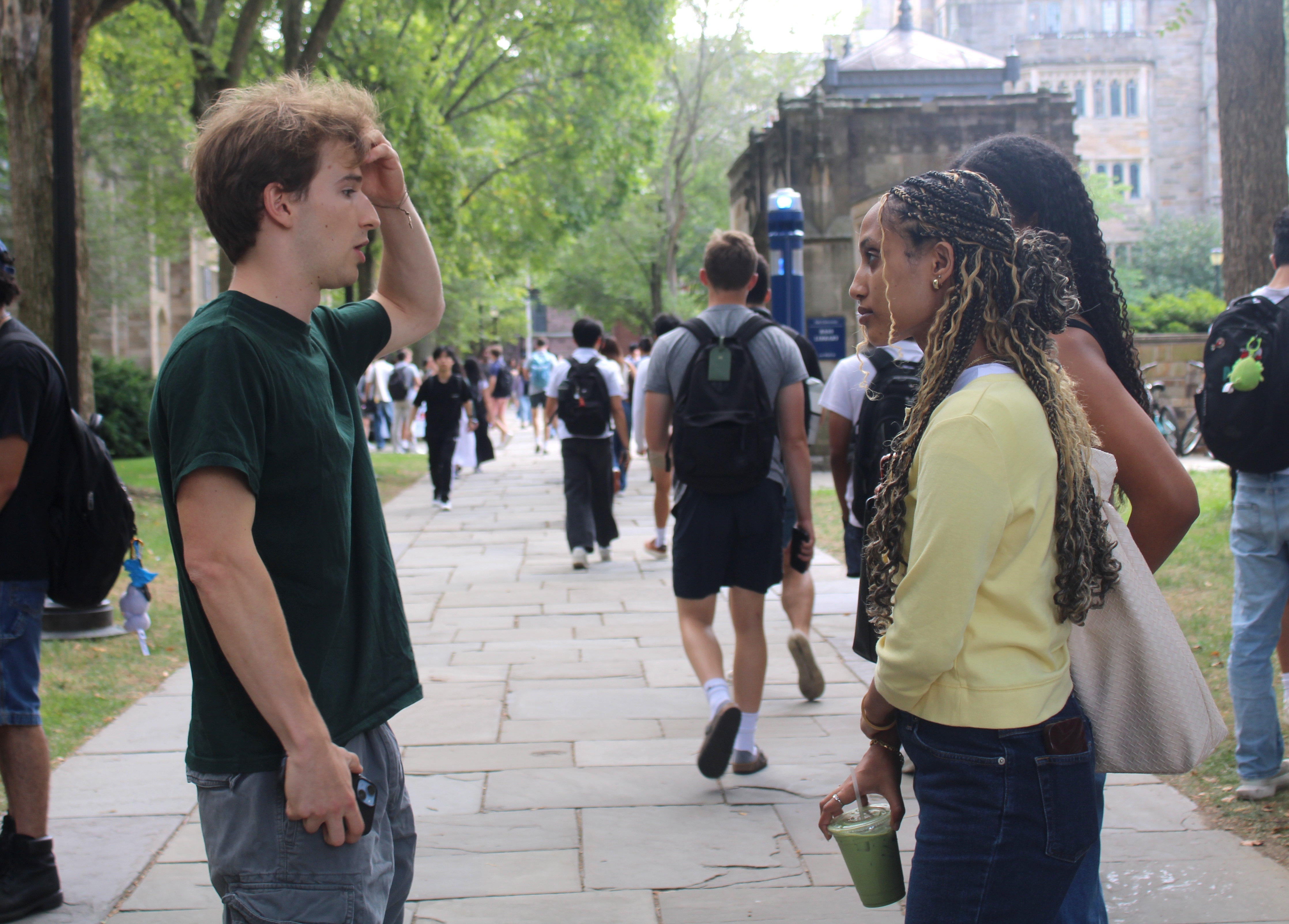
Laura Glesby photos
Ward 1 alder-hopefuls Elias Theodore (left) ...
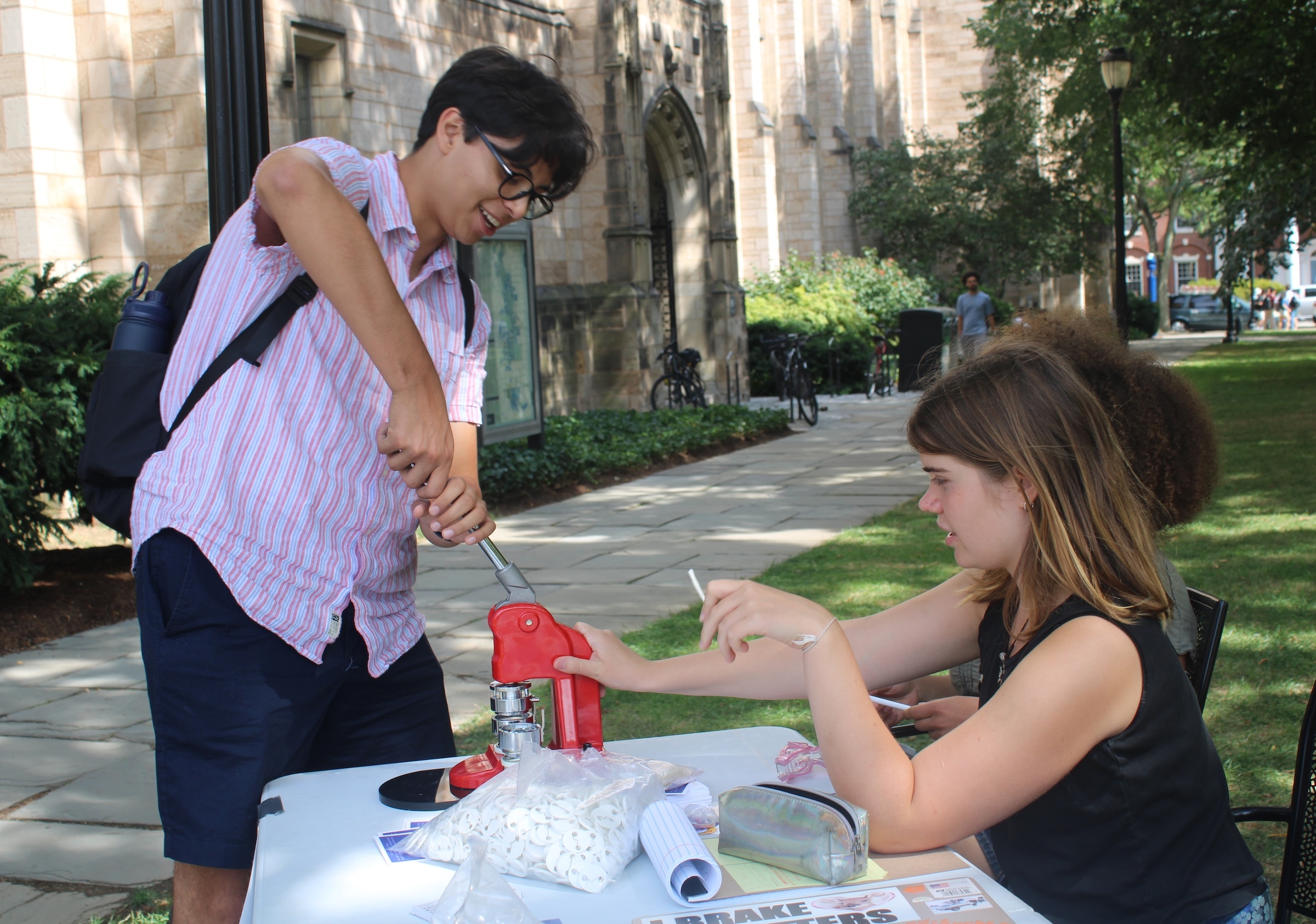
... Rhea McTiernan Huge (right) ...
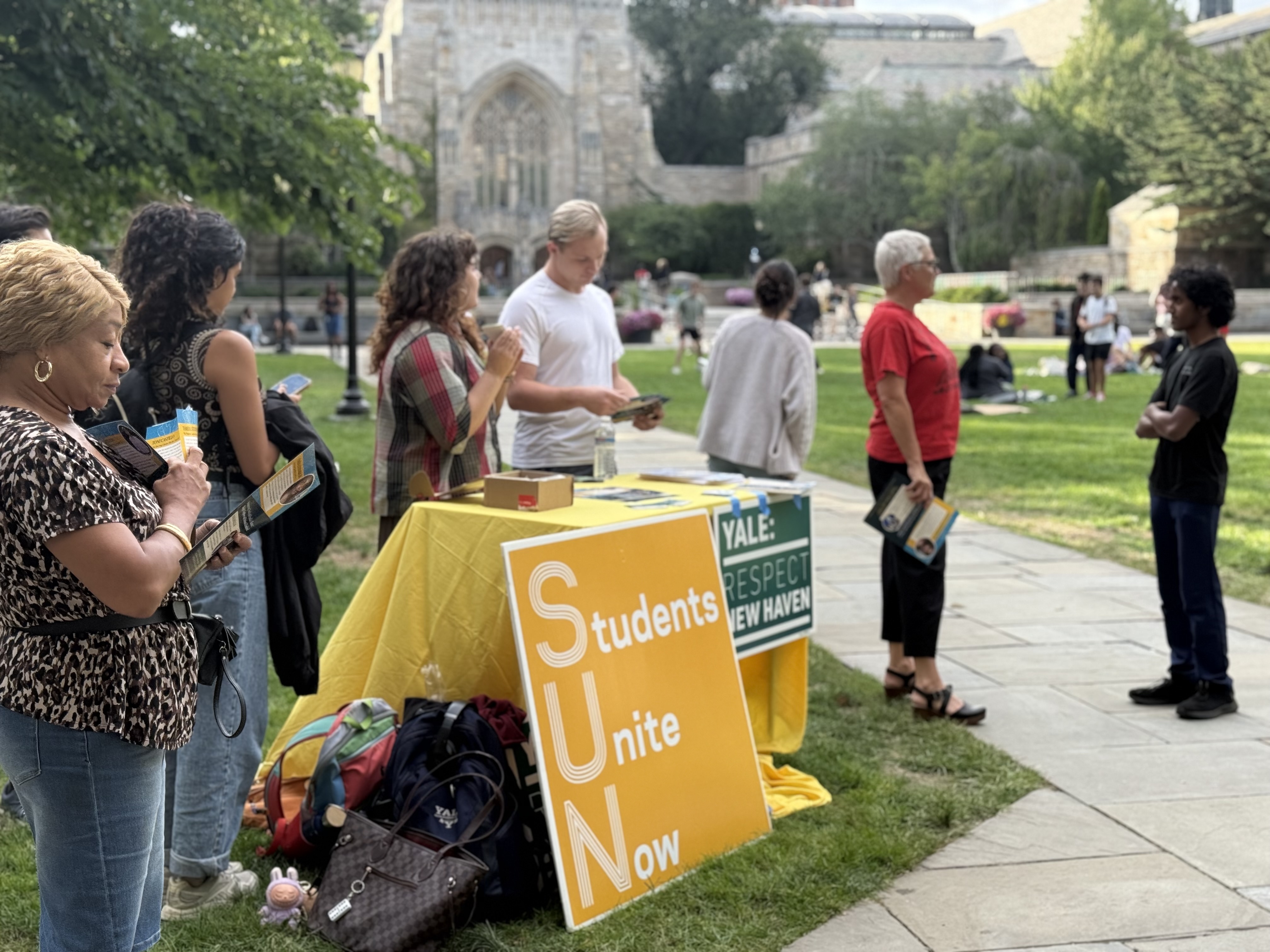
Adam Walker photo
... and Norah Laughter (center) make their respective campaign pitches on Yale's Cross Campus.
Three competing political candidates parked on Yale’s Cross Campus on Thursday and Friday afternoons, offering buttons, stickers, t‑shirts, and civic pep talks to the flurry of students passing by.
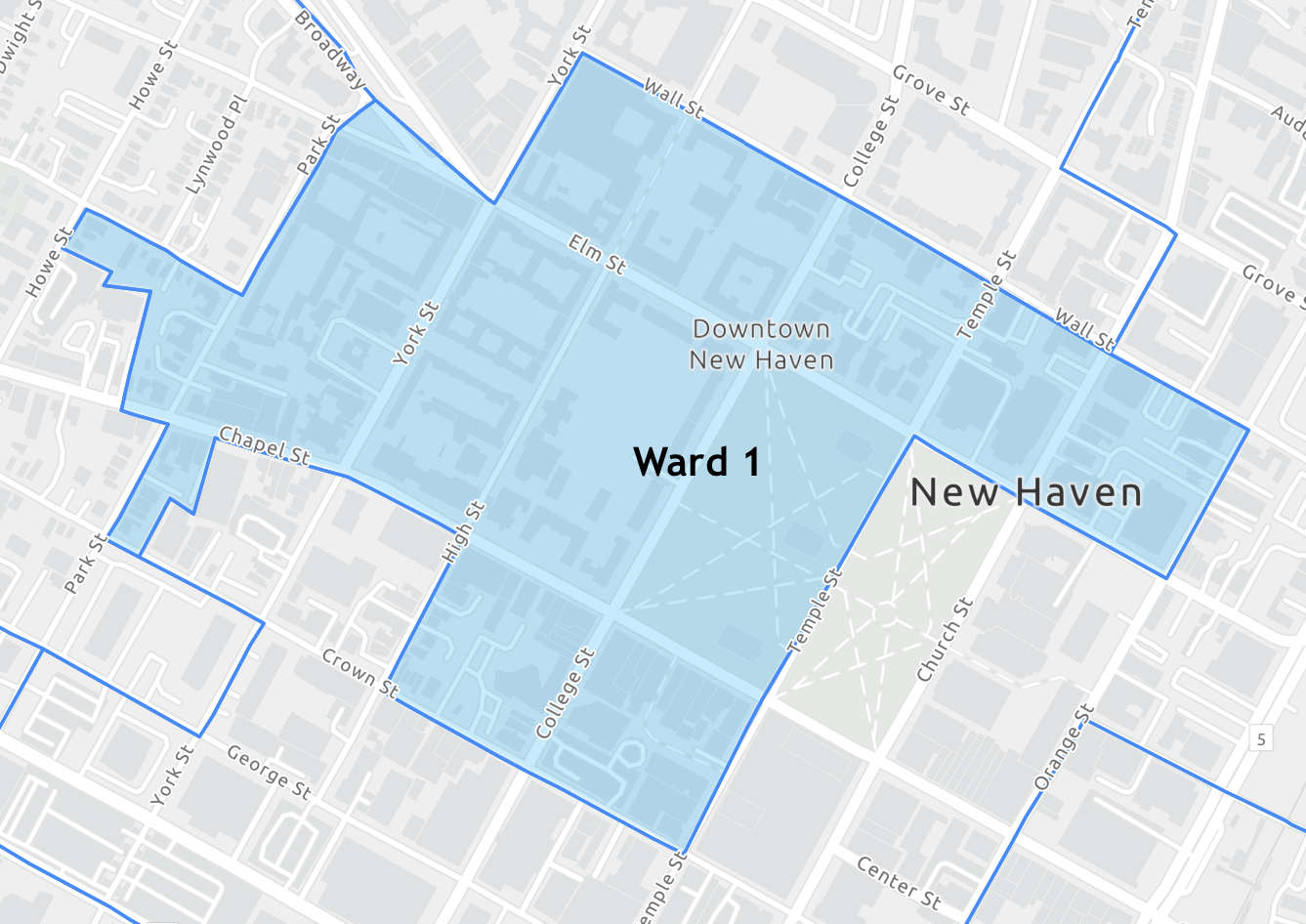
The Ward 1 boundaries.
The candidates — Elias Theodore, Rhea McTiernan Huge, and Norah Laughter — are all Yale college students vying to represent Ward 1 on the Board of Alders.
All three succeeded in petitioning their ways onto the Sept. 9 Democratic Party primary ballot.
Ward 1 covers about a third of Yale’s campus, along with a handful of nearby streets downtown and the upper half of the New Haven Green.
The ward has historically been represented on the Board of Alders by a Yale undergraduate. (The four most recent students elected to the role all grew up in New Haven.) Currently, the seat is being held by Kiana Flores, who grew up in Fair Haven and graduated from Yale College in the spring; Flores has decided not to run for a second term.
The ward’s unique constituency both complicates and simplifies the Ward 1 alder position.
As students graduate, move to dorms outside of the ward, or move off campus each year, the ward has an unusually high turnover of residents. Many students register to vote in their hometowns rather than in New Haven. Meanwhile, much of the non-Yale residences contained in the ward are in mid- or high-rise buildings with security measures that can make it hard for alders to knock on doors and meet their neighbors.
At the same time, the Ward 1 alder typically has less of a load compared to their counterparts when it comes to advocating for services like sidewalk fixes or anti-blight measures, as Yale covers those concerns in much of the district.
As they tabled on the lawn outside Yale’s main library, Theodore, McTiernan Huge, and Laughter spoke to students about their plans to bridge New Haven’s town-gown tensions and pressure the university to contribute more funding and resources to the city — and told three different stories about their connections to the city beyond Yale.
"This Is Where You Live"
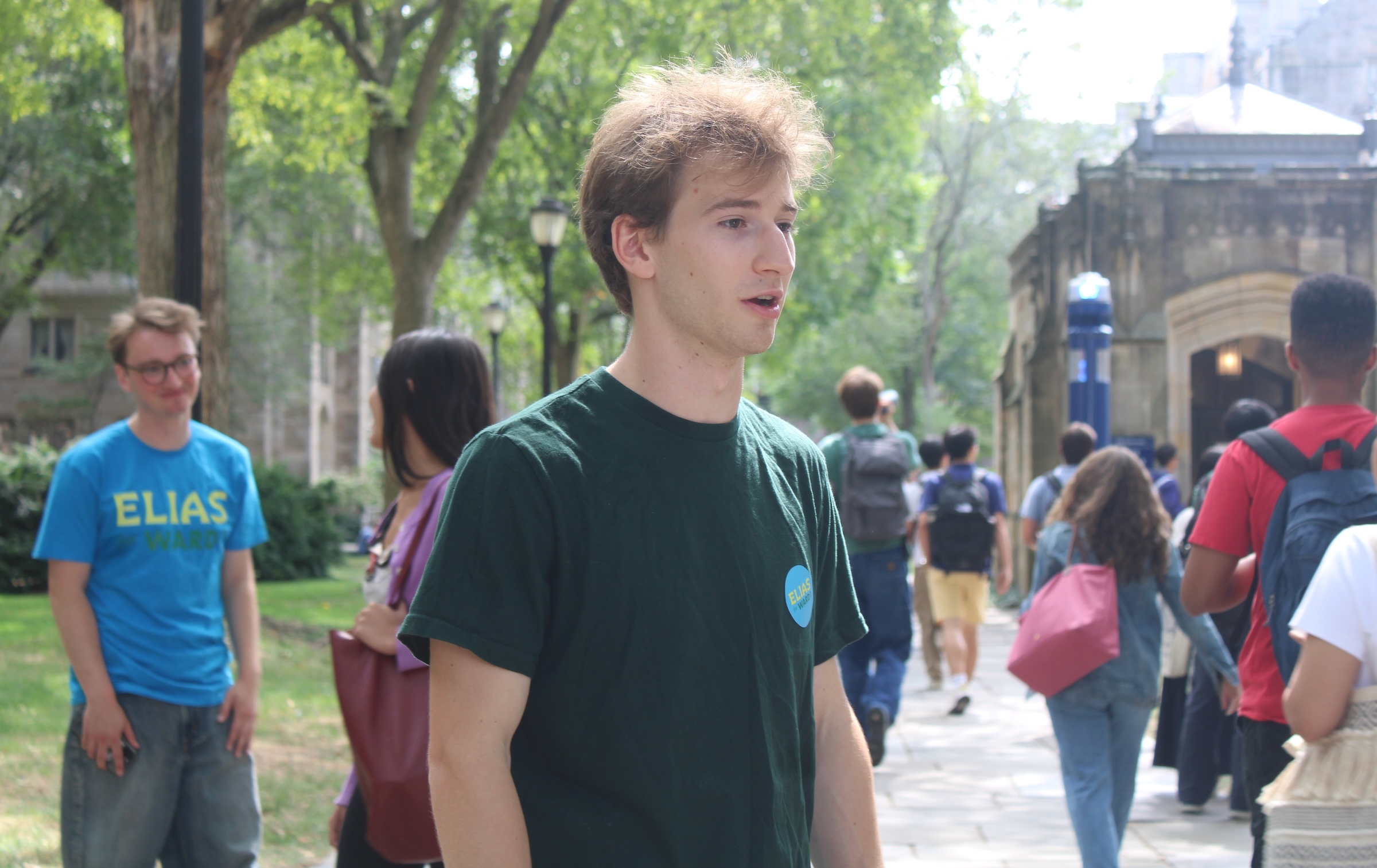
Elias Theodore asks classmates if they're registered to vote in New Haven.
Elias Theodore was joined by eight or so classmates working on his campaign on Thursday afternoon, handing out stickers and urging fellow students to register to vote in New Haven.
“Are you Elias?” asked one student, pronouncing it El-eye-us. “I’ve seen some signs from you!”
“El-ee-us,” said Theodore, having clearly made the same correction many times that day. He stretched out a hand and asked whether the student was registered to vote.
Theodore is a college junior majoring in Urban Studies. He grew up in East Rock and graduated from Wilbur Cross High School. He said that he sees himself as distinct from the other candidates as someone who isn’t affiliated with the “incumbent Ward 1 administration.”
While incumbent alder Flores has endorsed McTiernan Huge and the Unite Here union coalition has endorsed Laughter as part of a slate with Dwight Alder Frank Douglass, Theodore is campaigning independently. “I’m just coming at this with a bunch of energy and love,” he said.
On Thursday, he was constantly in motion, initiating conversations with as many passersby as possible. He made social media reels with the help of his campaign manager, Zeke.
At one point, he found a bag of individually wrapped Pure Organic layered fruit bars among the campaign’s supplies. “Ohh, bruh, I forgot we had these! These are so gas,” he said, pouring the fruit bars onto the table for passersby to take.
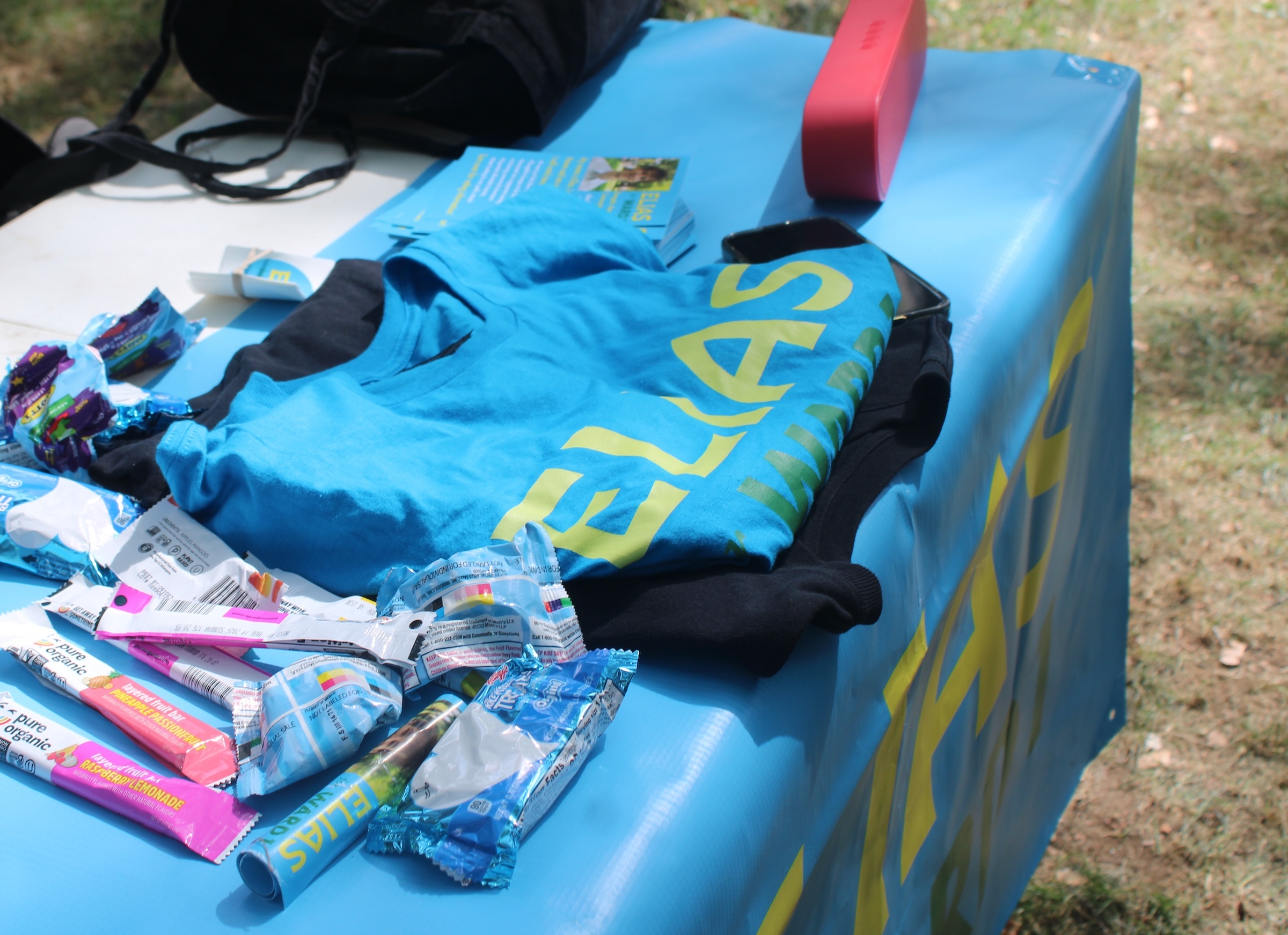
Snacks, shirts, and stickers on the campaign table.
Many students told Theodore that they had registered to vote in another state. Theodore explained that students are able to register to vote in both their college town and hometown, as long as they cast their vote in only one place for a given election.
“If you have local elections [outside of New Haven] in 2025 that you care about, vote there,” Theodore said. But for those hesitant to register in New Haven because they hope to vote in their hometowns next year, he encouraged them to register in both places. “This is where you live,” he said of New Haven, so it’s worth investing in civic life here.
Theodore said on Thursday that his team has registered over 150 students to vote over the course of the campaign so far. They walked groups of students to the Registrar of Voters’ office every afternoon that week for in-person registration. “It takes maybe 25 minutes, round trip,” he told his peers, pitching them on joining a walking group later in the afternoon.
“Do you happen to be a Ward 1 voter?” Theodore asked one college senior, Saron.
“I have seen your flyers,” Saron (who only wished to provide her first name) responded. “Where is Ward 1? Is it north?”
She explained that she’s a first-year counselor this year. “I live on O.C.,” she told Theodore, referring to Yale’s Old Campus — and learned that she is, indeed, a Ward 1 constituent.
Saron asked Theodore why he wants to be alder. He responded that he believes the alder can help strengthen the “Yale-New Haven relationship.” He said he wants to work to support the local businesses in the area and that he wants to ensure that residents have a voice in the future of the New Haven Green as the city intends to invest in park upgrades.
A city planning wonk, Theodore has described his campaign as focused on the granular, concrete changes for which alder can advocate, alongside a desire to build more civic energy and community within the ward.
“I think my platform is the most locally focused” on ward-level issues, he said — such as “making streets more A.D.A.-compliant” or proposing small, achievable zoning changes to encourage more housing in the city.
He’s also promised to advocate for more affordable, accessible businesses within the Shops at Yale downtown; support increased funding for public education; and foster more friendships between Yale students and New Haveners unaffiliated with the university.
After speaking with Theodore, Saron said she’s considering voting for him. “I’m definitely gonna do more research,” she added. “I will vote.”
"You Have A Voice"
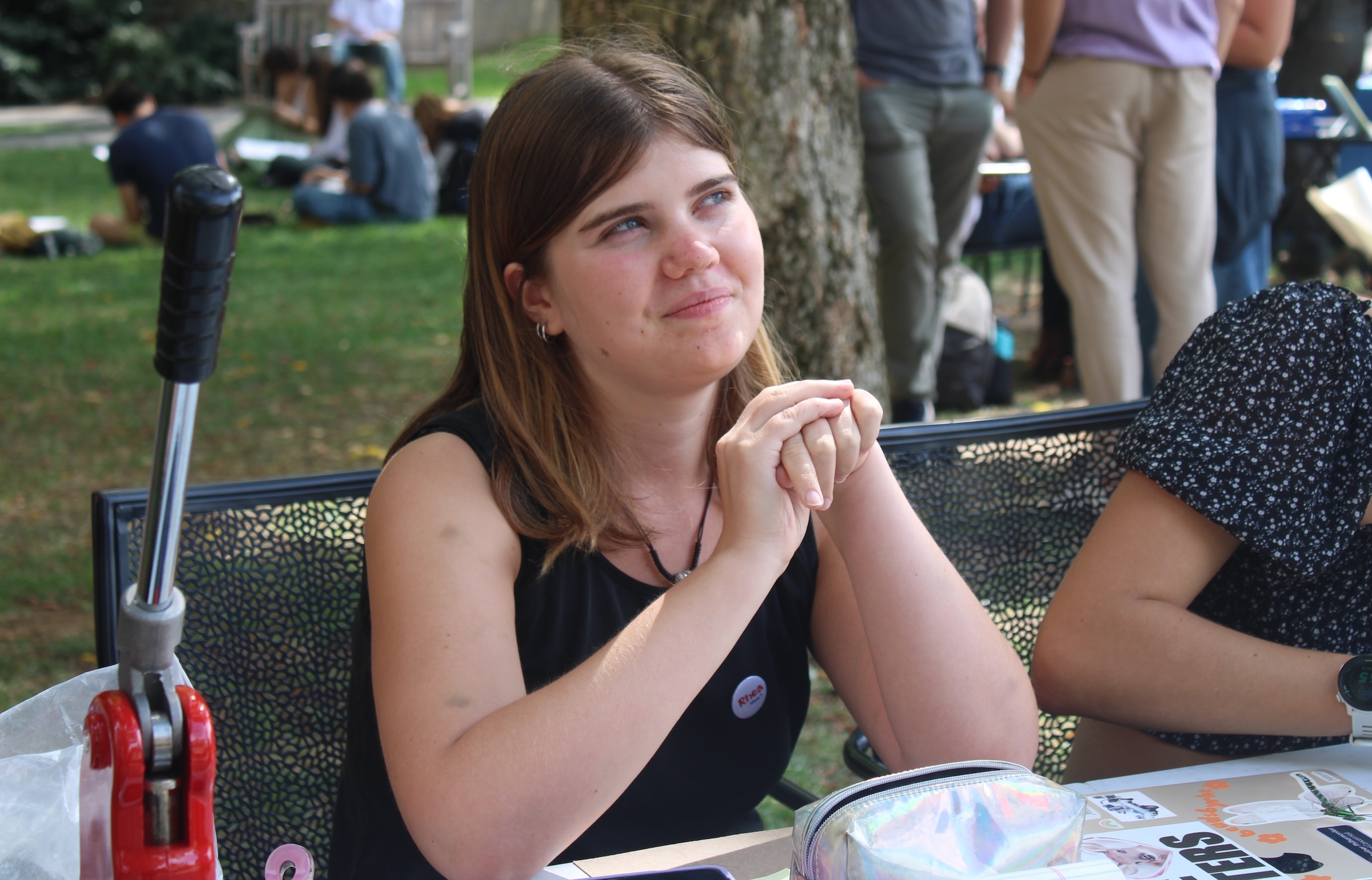
Rhea McTiernan Huge.
About 100 feet away from Theodore on Thursday sat his competitor, Rhea McTiernan Huge, alongside three of her classmates on her campaign team.
As McTiernan Huge spoke to voters, her friend Ana Paula Berlanga sat beside her, drawing snapshots of the New Haven Green and the Wooster Square farmer’s market on an iPad. She and McTiernan Huge plan to turn the drawings into silk-screen t‑shirt campaign merch. Berlanga had inked the words “Rhea for Ward 1” in small letters at the bottom. (“I didn’t want to make them so campaign-focused,” McTiernan Huge said.)
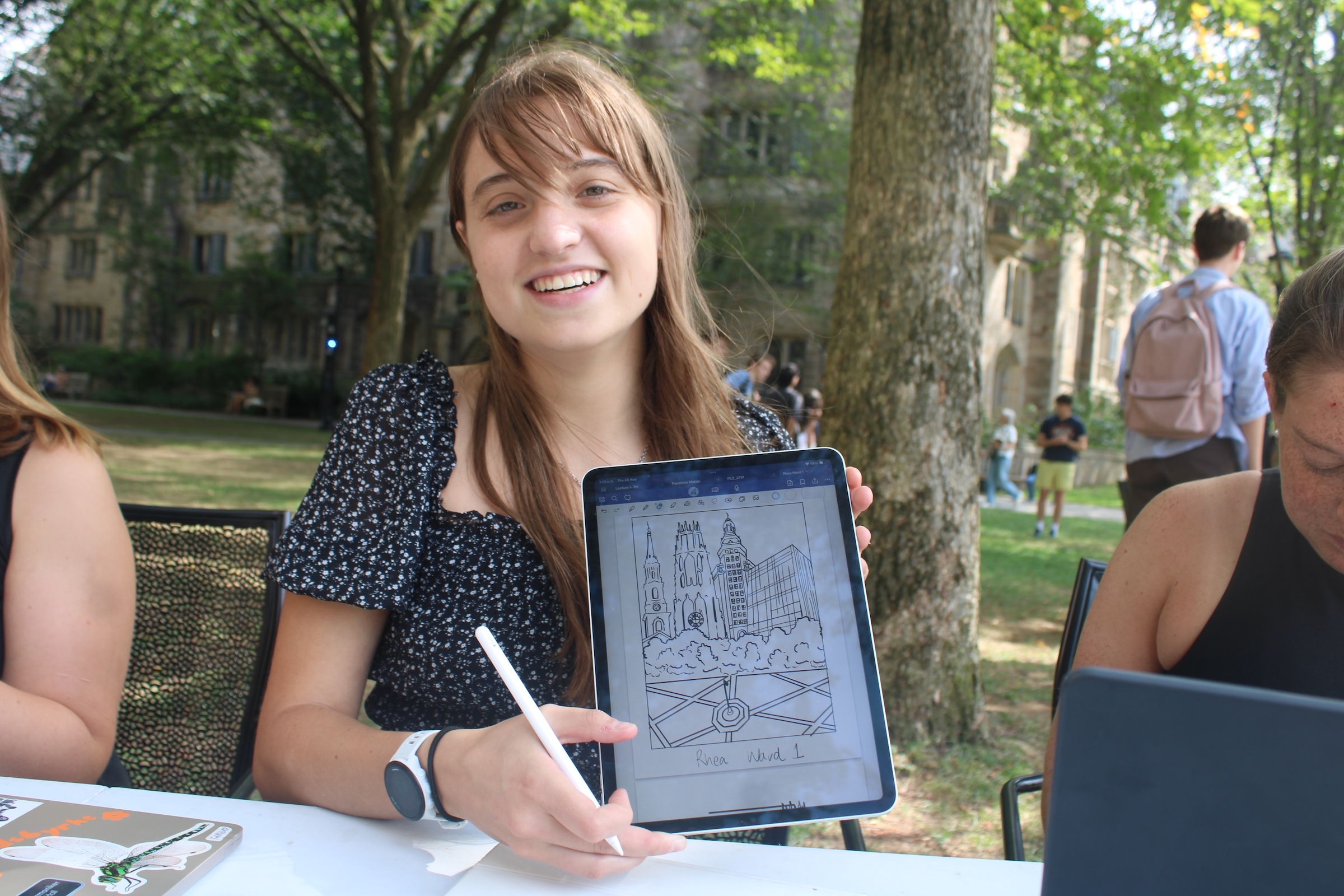
Ana Paula Berlanga's sketch of the New Haven Green for McTiernan Huge's campaign merch.
McTiernan Huge is a Yale junior majoring in Environmental Studies. She grew up in Wooster Square and, like Theodore, graduated from Wilbur Cross High School. She’s a member of the Trinity Church on the Green choir and a former farm stand worker at the Wooster Square farmer’s market. She’s also an artist. She makes jewelry, which she often sells at local art fairs through her business beadsbyrhe, and she also dabbles in linocut and fabric prints.
In general, she said, she likes to make things with her hands. So instead of handing out stickers and snacks, McTiernan Huge invited passersby to make their own campaign pins with a button-making machine.
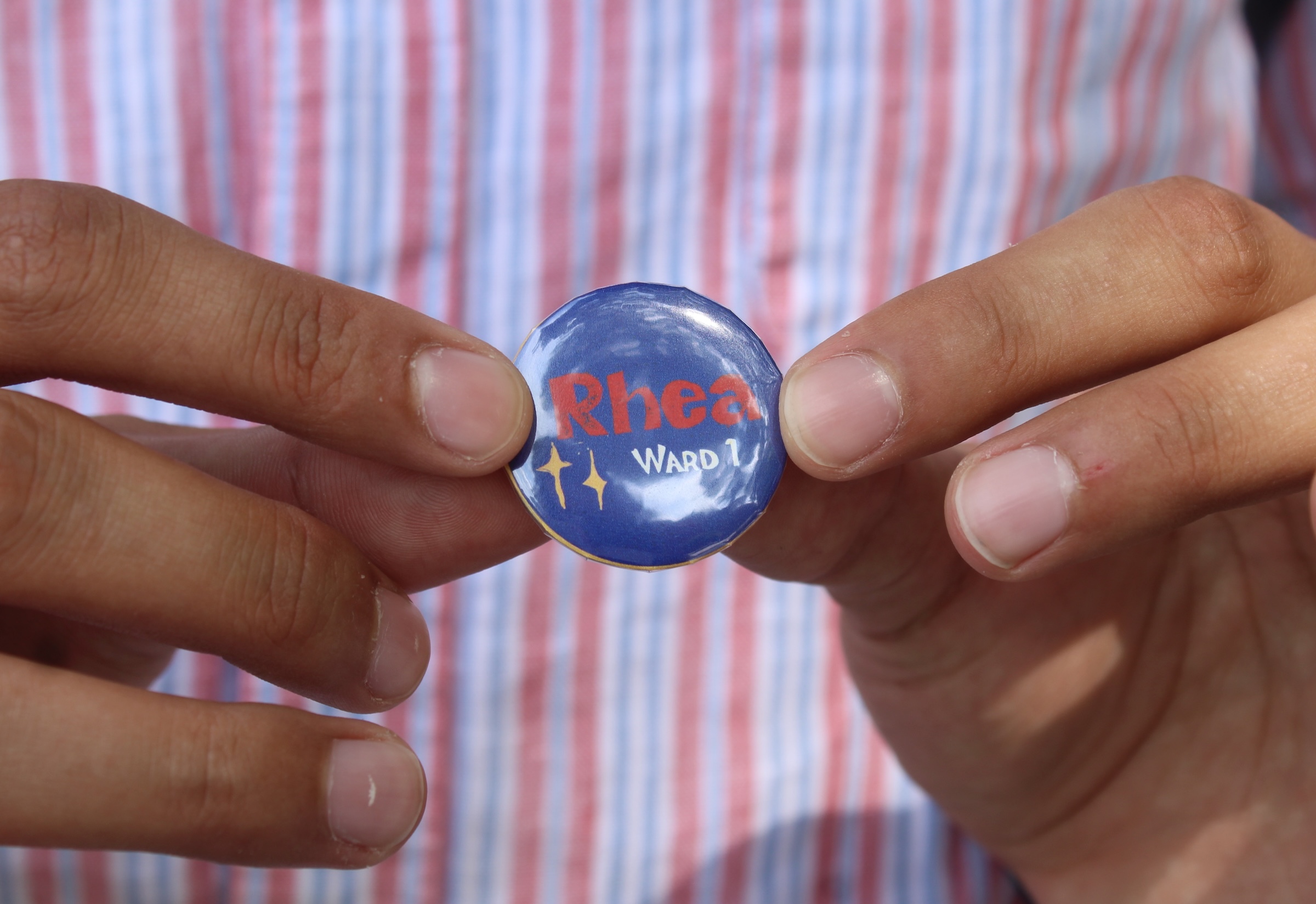
John Carlos Gonzalez makes a campaign button.
She made several buttons herself as she spoke about her experiences in the city.
Her first exposure to the power of political advocacy came when she was a Wilbur Cross junior. McTiernan Huge started an online petition to call for the city to remove the Wooster Square Park statue of Christopher Columbus. The petition took on a momentum of its own, part of a wave of advocacy to remove statues of racist and violent historical figures in the summer of 2020. It garnered nearly 4,000 signatures and helped propel the statue’s removal. “Every single one of those people who signed” became part of a broader “community effort” to make the change, McTiernan Huge recalled.
The statue that eventually replaced Columbus, which depicts a family of new Italian immigrants, “speaks to the Italian American experience” more thoughtfully, McTiernan Huge (who is herself Italian-American) said. “It brings immigration into the conversation” and connects to the stories of other new residents to the city. She views it as a step “to create more spaces in which people felt completely welcome” in New Haven.
On Thursday afternoon, rather than actively intercepting pedestrians, McTiernan Huge generally waited for students to approach her.
“Are you Rhea?” asked Yale first-year student Chris Johnson, pronouncing it Ree-ah.
“Rei-ah,” responded McTiernan Huge. “Can I give you my spiel?”
After Johnson nodded, McTiernan Huge started by explaining what the Board of Alders is. “I was born and raised in New Haven,” she said. “I have the endorsement of incumbent alder Kiana Flores.” She named some of her campaign priorities: increasing funding for public schools, calling for Yale to contribute more to the city, protecting the city’s commitment to limit collaboration with ICE, and advocating for “safe and accessible transportation.”
“I also saw that Elias was running,” Johnson said. He asked McTiernan Huge what makes her campaign distinct from her competitors’.
McTiernan Huge paused to consider the question. “We both obviously care a lot about New Haven, and making sure Yale’s contributing,” she said.
She highlighted her experience collaborating with incumbent alder Kiana Flores. As a member of the student group Yale Bleeds, McTiernan Huge said she had reached out to Flores to see if New Haven Public Schools could benefit from support in providing menstrual products for students, which is now required by state law. McTiernan Huge said that she and Flores worked to facilitate Yale Bleeds’ support of the school system’s menstrual product distribution. Through that process, Flores became a mentor to McTiernan Huge.
“I want to emphasize your role in all of this,” McTiernan Huge told Johnson. “You have a voice in this system.”
Johnson had moved in to start college about a week prior. He said he’d already registered to vote a few days prior via Theodore’s campaign.
“Right now, the candidates sounded a little similar,” Johnson said. He said he might be leaning toward voting for McTiernan Huge due to her support from the incumbent alder, but he plans to look into the race further and learn more about all three candidates.
Recognizing Students' Stakes In Local Politics

Contributed photo
Candidate Laughter.
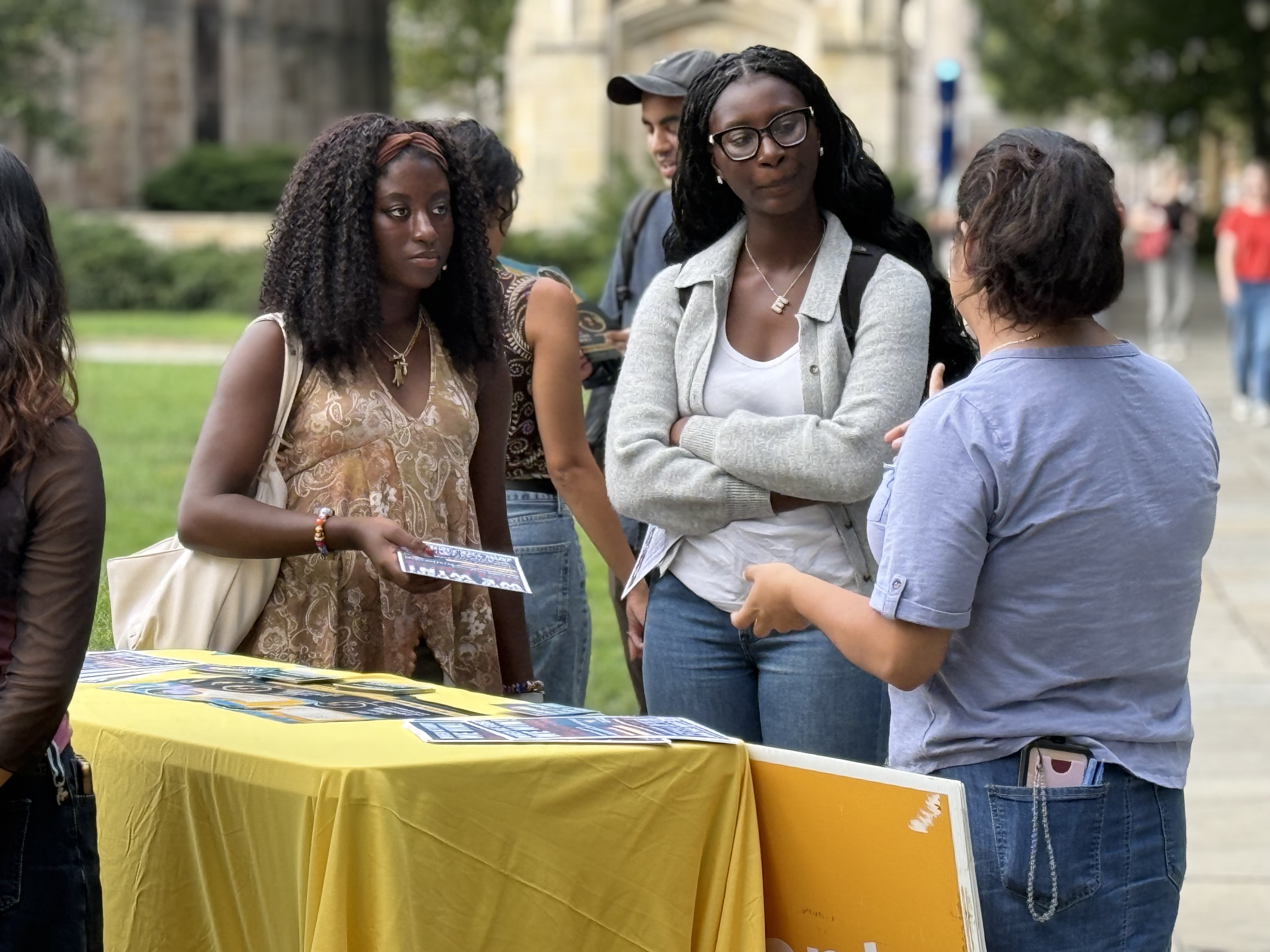
Yalies Constanza Biney and Esther-Josette Boateng stop by Laughter's campaign table.
On Friday evening, from 5:30 to 6:30 p.m., Norah Laughter sat behind a table on Cross Campus, speaking with undergraduates about why they should register to vote locally while handing out campaign flyers and stickers. Thus far she has grounded her campaign in convincing Yale students to see their stake in New Haven politics.
Unlike her Ward 1 opponents Theodore and McTiernan Huge, Laughter is not from New Haven — she grew up in Kentucky — and has centered her pitch on the idea that students’ presence already shapes the city’s politics and should be exercised directly at the ballot box.
“The reason that I switched my registration was because I realized that as an undergraduate student at this university, the largest employer in the city of New Haven, they make a lot of decisions about the city’s money, about the city’s property, about their relationships that they have with workers and residents in the name of the undergraduate program,” Laughter told the Independent. “My voice is kind of indirectly used to justify the decision that the university makes, which often harms workers and residents.”
Laughter said she believes it is essential for students to be civically engaged in the city where they live and work, noting that undergraduates are residents of New Haven during their time at Yale. She explained that part of her outreach is helping students recognize their stake in local politics and encouraging them to register to vote in New Haven, especially if they have not yet updated their voter registration.
Students who stopped by her table, Laughter said, often voiced concerns about Yale’s voluntary financial contribution to New Haven, which is currently up for renegotiation as the current six-year deal nears its end. Others raised questions about their own role in city politics, organized labor’s presence on campus, and the federal administration’s impact on both financial aid and the university’s relationship with the city.
Laughter said she stands apart from her opponents because of her endorsement from New Haven Rising, the grassroots labor-advocacy coalition that helped push Yale to double its voluntary contribution.
“I have union members handing out flyers for me right now talking to folks about why the Ward 1 race matters for them and for the city and for students in solidarity,” she said, adding that her campaign emphasizes one-on-one conversations about the links between students’ experiences and the struggles of New Haven workers.
Leslie Blatteau, president of the New Haven Federation of Teachers, was among those handing out flyers Friday evening alongside several other union members.
Among those who stopped at Laughter’s table Friday evening were Yale sophomores Constanza Biney and Esther-Josette Boateng, who both said they plan to cast ballots in the upcoming Ward 1 election.
Boateng, who lives in Yale’s Pierson College during the academic year and recently moved with her family to Wethersfield, said that turning 18 this year motivated her to take part in local politics.
“I just turned 18, so I’m trying to be an informed voter and go through the process,” she explained, adding that she sees voting as a way to fully exercise her rights.
Biney, who is originally from Houston and currently lives on Yale’s campus, echoed that sentiment, emphasizing that it is important for students to have a say in decisions that directly affect the community where they live.
Both pointed to Yale’s influence on the city’s finances as a key factor shaping their political concerns. Boateng said she is paying attention to issues like the university’s tax-exempt property status, which shifts the burden onto local residents, and added that candidates’ positions on how to address that gap will weigh heavily on her decision.